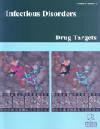-
s Malaria, Anti Malarial Drugs and the Role of Melatonin
- Source: Infectious Disorders - Drug Targets, Volume 12, Issue 5, Oct 2012, p. 371 - 379
-
- 01 Oct 2012
Abstract
Malaria, one of the most deadly diseases of our time affects more than 200 million people across the globe and is responsible for about one million deaths annually. Until recently Plasmodium falciparum has been the main cause for malarial infection in human beings but now Plasmodium knowlesi from Malaysia remains as one of the most virulent parasite spreading fast not only in Malaysia but in different parts of the world. Hence there is urgent need for the global fight to control malaria. Global malaria eradication program by use of insecticide spraying has resulted in good response in the past. Treatment of malaria infected patients with anti-malarial drugs has helped to eliminate malarial infections successfully but with increased resistance displayed by malarial parasites to these drugs there is resurgence of malaria caused both by drug resistance as well as by infection caused by new malarial species like Plasmodium knowlesi. With recent advances on molecular studies on malarial parasites it is now clear that the pineal hormone melatonin acts as a cue for growth and development of Plasmodium falciparum. Same may be true for Plasmodium knowlesi also. Hence treatment modalities that can effectively block the action of melatonin on Plasmodium species during night time by way of using either bright light therapy or use of melatonin receptor blocking can be considered as useful approaches for eliminating malarial infection in man.


